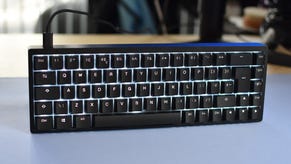AMD's Ryzen: A gaming CPU worth waiting for?
Terrible name, promising CPU
Something good is about to happen. I'm fairly sure of that. RPS isn't exactly hardware rumour central, of course. There's plenty of that elsewhere and, frankly, I can't compete. But after the downbeat tone of my recent Intel Kaby Lake coverage, I reckon it would be remiss not to balance things out with a quick preview of what to expect from AMD's new Ryzen CPU. It's definitely coming soon and will probably go on sale in around six weeks. Exactly how good is Ryzen going to be? I don't know. But all the indications are that it's going to be at least good enough to make AMD CPUs relevant for gaming again.
The unavoidable context to all this is the question of whether CPUs even matter for gaming. We haven't really the space to do that justice. It'll have to suffice to say that I think CPUs do matter and I think having faster CPUs will enable better games.
That aside, what's for sure is that AMD's inability to really compete over the last, say, five years has allowed Intel to sandbag pretty spectacularly. We are all paying more for less processor performance than would have been the case had AMD kept Intel honest.
With that party-political polemic despatched, let's talk about Ryzen. As the name implies, it's based on AMD's new Zen CPU architecture. I believe it's pronounced with a long 'i' as in 'high', but it's also seemingly play on 'risen', which has a short 'i'. It's a fairly odd name for a CPU, but then marketing has never been AMD's strong point.
I've covered the basics before, but the short version is that the new chip is something of a back to basics design. It's all about proper old-school CPU cores that get a lot of work done each operating cycle, just like Intel's CPUs.
In fact, AMD's approach is arguably even more old school than Intel since it won't insist on lumping the CPU die with huge amount of non-processor circuitry, like Intel does with many of its chips. You can no long buy a mainstream Intel CPU without integrated graphics.
I reckon that's critical. Check out the die map of of a quad-core Intel processor above. It's a Broadwell chip (so a Core i7-5xxx Series) with the biggest integrated graphics option. Roughly half the chip is graphics. That's an awful lot of largely useless baggage you have to pay for.
Admittedly, most of what you might call Intel's gaming-centric mainstream desktop chips don't have the biggest available graphics solution. But here's a Kaby Lake map of the die used in the Core i5 and Core i7 chips I covered last week.
Yup, it's 35, maybe 40 per cent graphics. OK, the graphics bits are used for more than just gaming. But the point is that Intel blows a lot of die space of stuff that we gamers mostly don't care about on the desktop because we all have a proper graphics card.
That's a huge let off for AMD and helps offset the fact that Intel will typically have a process advantage. If Intel used all those transistors for CPU cores in its mainstream chips, AMD wouldn't have a chance. But Intel doesn't. So AMD does, thank goodness.
Anyway, the alleged specifics of AMD's product plans have now emerged and there will purportedly be three basic models – the four-core SR3, the six-core SR5 and the eight-core SR7 (AMD has said publicly that the first chips will top out at eight cores, each with the ability to process two threads a la Intel's HyperThreading).
There will also be AMD APUs based on the same core architecture and with graphics built in. But most of the pure-CPU Ryzen chips will be priced up against mainstream Intel chips with that integrated graphics baggage.
Speaking of pricing, supposedly it'll be $150 for the quad-core chip, $250 for the six-core model and $350 for the full eight cores, plus a special overclocking model for $500 (though all models will be unlocked and overclocking friendly, which is another easy win versus Intel and its restrictive approach to overclocking).
But what of performance, I hear you cry? AMD has said all chips will have a minimum baseclocks of 3.4GHz. Of course, clockspeeds don't mean much when you're comparing different architectures.
However, AMD has performed various public demonstrations in recent months. Probably the most intriguing involved an eight-core Ryzen versus an eight-core Intel Core i7-6900K. The AMD chip was slightly faster in a range of demo benchmarks including, critically, Battlefield 1. The 6900K is a $1,000 CPU. You can watch the demo here on AMD's Youtube channel. Hmmm.
Various alleged benchmarks of early engineering sample Ryzens have also been doing the rounds and make for a similar story. I'm not sure I totally buy the idea that AMD is going to be selling a chip that matches or beats a $1,000 Intel chip for just $350. But I think AMD has almost certainly closed much of the per-core performance gap to Intel.
It's also worth noting that the financial markets are much more bullish about AMD of late. As recently as February last year, AMD was trading at $1.80 a share. It's now up over $10. Clearly, the self-styled master race of financiers are pricing in expectations of something very good coming down the line.
Similarly, I cannot help but notice that at around the same time that Intel will very likely have found out just how competitive Ryzen is likely to be (if anyone outside AMD knows what to expect from Ryzen, it will be Intel) a six-core CPU first appeared on its mainstream CPU roadmap. I do not believe that is a coincidence.
The bit of the story I won't cover here is the supporting motherboard chipsets that come with Ryzen. Arguably, they're just as desperately needed as the CPU itself, so utterly antiquated have AMD's desktop chipsets become. The outlook here looks fairly promising, too. But we'll cover the details when the chips finally launch, probably at the beginning of March.
Much of the above, therefore, is just a bit of fun. I don't think Ryzen is going to blow Intel away. If the rumoured Ryzen pricing is right, that indicates a competitive CPU, not an Intel killer. But that's all we actually need. Something competitive to wake Intel up and keep prices honest.
I reckon a six-core Ryzen for $250 / £225 with a spot of overclocking could well be the gamer and sensible-money PC enthusiast's weapon of choice this summer. But worst case scenario, Ryzen will mean we'll all have to pay less for a gameable CPU, whoever we buy it from. And that cannot be a bad thing.












